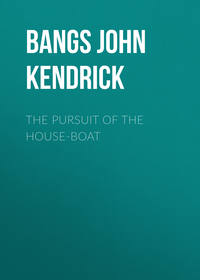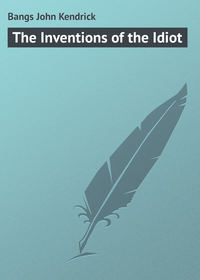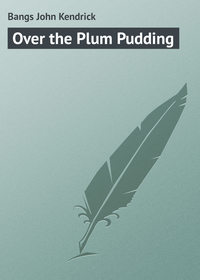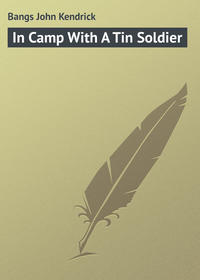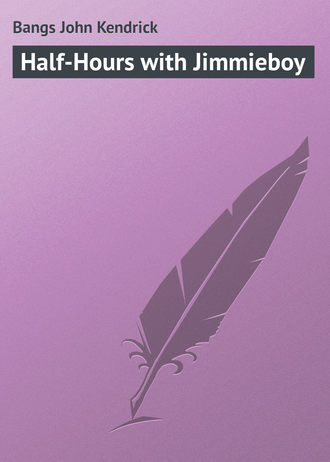 полная версия
полная версияHalf-Hours with Jimmieboy
"The what?" asked Jimmieboy, to whom words like impediment were rather strange.
"Why, the bone that kept him from growing," explained the story teller. "He loosened that and began to grow again, and inside of two weeks he was as handsome a six-footer as you ever saw, and as he had made a million and a half of dollars he resigned from the Exhibition and settled down in Europe for a number of years, had himself made a Grand Duke, and then came back to New York and got married, and lived happy ever after."
And then, as the getting-up bell rang down stairs, Jimmieboy thanked his father for the story and went into the nursery to dress for breakfast.
III.
JIMMIEBOY'S DREAM POETRY
If there is anything in the world that Jimmieboy likes better than custard and choo-choo cars, it is to snuggle down in his papa's lap about bedtime and pretend to keep awake. It doesn't matter at all how tired he is, or how late bedtime may on special occasions be delayed, he is never ready to be undressed and "filed away for the night," as his Uncle Periwinkle puts it.
It was just this way the other night. He was as sleepy as he possibly could be. The sandman had left enough sand in his eyes, or so it seemed to Jimmieboy, to start a respectable sea-beach, and he really felt as if all he needed to make a summer resort of himself was a big hotel, a band of music, and an ocean. But in spite of all this he didn't want to go to bed, and he had apparently made up his mind that he wasn't going to want to go to bed for some time to come; and as his papa was in an unusually indulgent mood, the little fellow was permitted to nestle up close under his left arm and sit there on his lap in the library after dinner, while his mamma read aloud an article in one of the magazines on the subject of dream poetry.
It was a very interesting article, Jimmieboy thought. The idea of anybody's writing poetry while asleep struck him as being very comical, and he laughed several times in a sleepy sort of way, and then all of a sudden he thought, "Why, if other people can do it, why can't I?"
"Why?" he answered – he was quite fond of asking himself questions and then answering them – "why? Because you can't write at all. You don't know an H from a D, unless there's a Horse in the picture with the H, and a Donkey with the D. That's why."
"True; but that's only when I'm awake."
"Try it and see," whispered the Pencil in his papa's vest pocket. "I'll help, and maybe our old friend the Scratch Pad will help too."
"That's a good idea," said Jimmieboy, taking the Pencil out of his papa's pocket, and assisting it to climb down to the floor, so that it could run over to the desk and tell the Scratch Pad it was wanted.
"Don't you lose my pencil," said papa.
"No, I won't," replied Jimmieboy, his eyes following the Pencil in its rather winding course about the room to where the desk stood.
"I have to keep out of sight, you know, Jimmieboy," the Pencil said, in a low tone of voice. "Because if I didn't, and your papa saw me walking off, he'd grab hold of me and put me back in his pocket again."
Suddenly the Pencil disappeared over by the waste-basket, and then Jimmieboy heard him calling, in a loud whisper: "Hi! Pad! Paddy! Pad-dee!"
"What's wanted?" answered the Pad, crawling over the edge of the desk and peering down at the Pencil, who was by this time hallooing himself hoarse.
"Jimmieboy and I are going to write some dream poetry, and we want you to help," said the Pencil.
"Oh, I'm not sleepy," said the Pad.
"Neither am I," returned the Pencil. "But that needn't make any difference. Jimmieboy, does the sleeping and dreaming, and you and I do the rest."
"Oh, that's it, eh? Well, then, I don't mind; but – er – how am I ever going to get down there?" asked the Pad. "It's a pretty big jump."
"That's so," answered the Pencil. "I wouldn't try jumping. Can't the Twine help you?"
"No. He's all used up."
"Then I have it," said the Pencil. "Put a little mucilage on your back and slide down. The mucilage will keep you from going too fast."
"Good scheme," said the Pad, putting the Pencil's suggestion into practice, and finding that it worked beautifully, even if it did make him feel uncomfortably sticky.
And then, arm in arm, they tip-toed softly across the room and climbed up into Jimmieboy's lap. So quietly did they go that neither Jimmieboy's mamma, nor his papa noticed them at all, as they might have had the conspirators been noisy, although mamma was reading and papa's head was thrown back, so that his eyes rested on the picture moulding.
"Here we are, Jimmieboy," said the Pad. "Pen here tells me you're going to try a little dream poetry."
"Yes," said Jimmieboy. "I am, if you two will help."
"Count on us," said the Pencil. "What do you do first?"
"I don't exactly know," said Jimmieboy. "But I rather think I take Pencil in my hand, Pad in my lap, and fall asleep."
"All right," said the Pad, lying flat on his back. "I'm ready."
"So am I," put in the Pencil, settling down between two of Jimmieboy's fingers.
"All aboard for sleep," said Jimmieboy, with a smile, and then he fell into a doze. In about two minutes he opened his eyes again, and found both Pad and Pencil in a great state of excitement.
"Did I write anything?" asked Jimmieboy, in an excited whisper.
"Yes," said the Pad. "You just covered me up with a senseless mass of words. This isn't any fun."
"No," said the Pencil. "It's all nonsense. Just see here what you've got."
Jimmieboy looked anxiously at the Pad, and this is what he saw:
I seen since,memory's wrong,They both dressedcouple walkedAnd straightway changeupstairs with me,"I think it's"If that's the case,"catch the early in."to leave the shop,for it's plaPolypop.two weeks yesterday."haven't utteredOh, Polypop, Iersnee, "See here,He didn't paymoon was shining bright.To see thePolypop came down"Dear me!" he said. "Why, that doesn't mean anything, does it?"
"No. There isn't much in dream poetry, I guess," said the Pad. "I'm going back home. Good-by."
"Oh, don't go," said the Pencil. "Let's try it again – just once more. Eh?"
"Very well," returned the Pad, good-naturedly, tearing off one of his leaves. "Go ahead, Jimmieboy."
And Jimmieboy dozed off again.
"Wake up, wake up!" cried the Pencil in about three minutes. "We've got something this time."
But they were all disappointed, for, when they looked, all that they could see was this:
have not themAnd if my notwere in chintz;With that the along;your vest."For you to goReplied best,the Snickersnee,And traI hadn't time"My reason in;"I know it," said theSinceYou one small cheer,say,Then quoth the Snickhis fee.And as theSnickersnee,The one night,"Rubbish!" said the Pad, indignantly. "There's two leaves of myself wasted now on your old dream poetry. I think that's enough. I'm off. Good-by."
"Don't be hasty, Pad," retorted the Pencil. "That's a great deal better than the other. Why, there's one part there with all the lines beginning with capitals, and when that happens it's generally a sign that there's poetry around."
"There isn't much there, though," said Jimmieboy, a little disappointed by the result. "I guess Pad's right. We'd better give it up."
"Not yet," pleaded the Pencil. "There's luck in odd numbers, you know. Let's try it just once more."
"Shall we, Jimmieboy?" asked the Pad.
"Yes. Let's," assented Jimmieboy, as he dropped off to sleep for the third time.
This time he must have slept five minutes. When he opened his eyes he saw the Pencil staring blankly at the Pad, on which was written nothing more than this curious looking formula:

"How aggravating!" said Jimmieboy.
"Abominable!" ejaculated the Pad.
"I believe it's a key to what has gone before," said the Pencil, shaking his rubber wisely. "Two and two make four – two and two make four. Ah! I know. You've got to put two and two together to make four. If we put those two leaves of nonsensical words together, maybe we'll have a poem. Let's try."
"It'll use me up, I'm afraid," sighed the Pad.
"Oh, no. It won't take more than a half of you," said the Pencil, putting the two leaves on which Jimmieboy had first written together.
"It looks like a poem," he said, when he had fitted the two together. "Let's see how it reads.
"I have not seen them since.And if my memory's not wrong,They both were dressed in chintz,With that the couple walked along;""That doesn't mean a blessed thing," said the Pad.
"It's nonsense," said Jimmieboy.
"Just wait!" said the Pencil, beginning to read again:
And straightway change your vest."For you to go upstairs with me,Replied, "I think it's best"If that's the case," the SnickersneeAnd catch the early train."I hadn't time to leave the shop"My reason for it's plain;"I know it," said the Polypop;"Since two weeks yesterday."You haven't uttered one small cheerOh, Polypop, I say,Then quoth the Snickersnee, "See here,He didn't pay his fee.And as the moon was shining bright,To see the Snickersnee,The Polypop came down one night"Ho!" jeered the Pad. "That's elegant poetry, that is. You might get paid five cents a mile for stuff like that, if you wanted to sell it and had luck."
"I don't care," said the Pencil. "It rhymes well."
"Oh, I know what's the matter," said Jimmieboy, gleefully. "Why, of course it's poetry. Read it upside down, and it's all right. It's dream poetry, and dreams always go the other way. Why, it's fine. Just listen:
"The Polypop came down one nightTo see the Snickersnee,And, as the moon was shining bright,He didn't pay his fee.""That is good," said the Pad. "Let me say the next:
"Then, quoth the Snickersnee, 'See here,Oh, Polypop, I say,You have not uttered one small cheerSince two weeks yesterday.'""I thought it would come out right," said the Pencil. "The next two verses are particularly good, too:
"'I know it,' said the Polypop;'My reason for it's plain;I hadn't time to leave the shopAnd catch the early train.'"'If that's the case,' the SnickersneeReplied, 'I think it's bestFor you to go upstairs with me,And straightway change your vest.'""Now altogether," cried the Pad, enthusiastically. "One, two, three!" And then they all recited:
"With that the couple walked along;They both were dressed in chintz;And if my memory's not wrong,I have not seen them since.""Hooray!" cried Jimmieboy, as they finished – so loudly that it nearly deafened the Pad, which jumped from his lap and scurried back to the table as fast as it could go.
"What's that cheer for?" asked papa, looking down into Jimmieboy's face, and grabbing the Pencil, which was on the point of falling to the floor.
"It's for Dream Poetry," murmured Jimmieboy, getting drowsy again. "I've just dreamed a lot. It's on the Pad."
"Indeed!" said papa, with a sly wink at mamma. "Let's get the Pad and read it."
The little fellow straightened up and ran across to the desk, and, grasping the Pad firmly in his hands, handed it to his father to read.
"H'm!" said papa, staring at the leaf before him. "Blank verse."
"Read it," said Jimmieboy.
"I can't to-night, my boy," he answered. "My eyes are too weak for me to see dream writing."
For between you and me that was the only kind of writing there was on that Pad.
IV.
A SUBTERRANEAN MUTINY
It seemed rather strange that it should have been left there, and yet Jimmieboy was glad that in grading his papa's tennis-court the men had left that bit of flat rock to show up on the surface of the lawn. It had afforded him no end of pleasure since he had first discovered it. As a make-believe island in a raging sea of grass, he had often used it to be cast away upon, but chiefly had he employed it as a vantage ground from which to watch his father and his father's friends at their games of tennis. The rock was just about large enough for the boy to sit upon and pretend that he was umpire, or, as his father said, mascot for his father's opponents, and it rarely happened that a game of tennis was played upon the court that was not witnessed by Jimmieboy seated upon his rocky coigne.
The strangest experience that Jimmieboy ever had with this bit of stone, however, was one warm afternoon last summer. It was at the drowsy period of the day. The tennis players were indulging in a game, which, to the little onlooker, was unusually dull, and he was on the point of starting off in pursuit of something, it mattered not what, so long as it was interesting enough to keep him awake, when he observed a most peculiar thing about the flat stone. It had unquestionably become transparent! Jimmieboy could see through it, and what he saw was of most unexpected quality.
"Dear me!" he ejaculated, "how very queer. This rock is made of glass."
Then he peered down through it, and saw a beautiful marble staircase running down into the earth, at the foot of which was a great door that looked as though it was made of silver, and the key was of gold. At the sides of the staircase, hanging upon the walls, were pictures of strange little men and women, but unlike the men and women in other pictures, they moved about, and talked, and romped, and seemed to enjoy themselves hugely. Great pictures were they indeed to Jimmieboy's mind, because they were constantly changing, like the designs in his kaleidoscope.
"I must get down there," he said, softly, to himself. "But how?"
As he spoke the door at the foot of the steps opened, and a small creature, for all the world like the goblin in Jimmieboy's fairy book, poked his head out. The goblin looked all about him, and then turning his eyes upward until they met those of the boy, he cried out:
"Hullo! Are you the toy peddler?"
"No," replied Jimmieboy.
"Then you are the milk broker, or the potato merchant, and we don't want any milk or any potatoes."
The goblin slammed the door when he had said this, and with such a bang that all the little people in the pictures ran to the edge of the frame and peered out to see what was the matter. One poor little fellow, who had been tending sheep in a picture half-way up the stairs, leaned out so far that he lost his balance and tumbled out head over heels. The sheep scampered over the hill and disappeared in the background of the painting.
"Poor little shepherd boy!" said Jimmieboy. "I hope you are not hurt!"
The shepherd boy looked up gratefully at the speaker, and said he wasn't, except in his feelings.
"Is there any way for me to get in there?" asked Jimmieboy.
"No, sir," said the shepherd boy. "That is, not all of you. Part of you can come in."
"Ho!" said Jimmieboy. "I can't divide myself up."
"Yes, you can," returned the shepherd boy. "It's easy enough, when you know how, but I suppose you don't know how, not having studied arithmetic. You can't even add, much less divide."
"Maybe you can tell me how," said Jimmieboy.
"Certainly, I can," said the shepherd boy. "The part of you that can come in is your eye, and your ear, and your voice. All the rest of you must stay out."
"But how do I get 'em in?" asked Jimmieboy.
"They are in now," said the other. "You can see me, you can hear me, and I can hear you."
"But I can't see what's beyond that door."
"Oh, we'll fix that," said the little shepherd. "I'll knock on the door, and when it is opened you can tell the goblin that you want to see what he's got, and he'll show it all to you if you tell him that your father is the man who didn't blast the rock out."
The shepherd boy then went softly down the stairs, knocked on the door, and before it was opened had flown back to his duties in the picture. Then, as he had intimated, the goblin opened the door again, and poking his head out as before, cried:
"Is that you, milk broker?"
"No," answered Jimmieboy. "I am the son of the man who didn't blast away the flat rock, and my eye and my ear and my voice want to come in."
"Why, certainly," said the goblin, throwing the door wide open. "I didn't know you were you. Let 'em walk right in."
Jimmieboy was about to say that he didn't know how his eye or his ear or his voice could walk anywhere, but he was prevented from so doing by the sudden disappearance of the staircase, and the substitution therefor of a huge room, the splendor of which was so great that it for a moment dazzled his eyes.
"Who comes here?" said a voice in the corner of the room.
"The eye and the ear and the voice of the son of the man who did not blast the flat stone," observed the goblin, and then Jimmieboy perceived, seated upon a lustrous golden throne, a shriveled-up dwarf, who looked as if he might be a thousand years old, but who, to judge from the crown he wore upon his head, was a king.
The dwarf was clad in garments of the richest texture, and his person was luminous with jewels of the rarest sort. As the goblin announced the visitor the king rose up, and descending from the throne, made a courtly bow to Jimmieboy.
"Thrice welcome, O son of the man who did not blast the flat rock," he said. "It is only fitting that one who owes so much to the father should welcome the eye and the ear and the voice of the son, for know, O boy, that I am the lord of the Undergroundies whose kingdom would have been shattered but for your father's kindly act in sparing it."
"I suppose that blasting the rock would have spoiled all this," said Jimmieboy's voice, as his eye took in the royal magnificence of the place, while to his ears came strains of soft and sweet music. "It would have been dreadful!"
"Much more dreadful than you imagine," replied the little king. "It would have worked damage that a life-time could not have repaired."
Then the king turned to a tall, pale creature in black who sat writing at a mahogany table in one corner of the throne room, and commanded him to recite into Jimmieboy's ear how dreadful it would have been.
"Compose, O laureate," he said to the tall, pale creature, "compose a song in which the dire effects of such a blast are fully set forth."
The laureate rose from his seat, and bowing low before the king and Jimmieboy's eye, began his song, which ran in this wise:
"A half a pound of dynamiteSet in that smooth, flat stone.Our palace would quite out of sightMost certainly have blown."It would have blown our window-panesTo high Gibraltar's ledge,And all our streets and country lanesIt would have set on edge."It would have knocked our royal kingAs far up as the moon;Beyond the reach of anything —Beyond the best balloon."It would have taken all our pears,Our candy and our toys,And hurled them where the polar bearsIndulge in horrid noise."It would have spoiled the music-box,And ruined all our books —Knocked holes in all our woolen socks,And ruined thus their looks."'T would have destroyed our chandeliers,To dough turned all our pie;And, worst of all, my little dears,It would have injured I.""Is that dreadful enough?" asked the laureate, turning to the king.
"It suits me," said the king. "But perhaps our friend Jimmieboy would like to have it made a little more dreadful."
"In that case," said the laureate, "I can compose a few more verses in which the blast makes the tennis-court over us cave in and bury all the cake and jam we have in the larder, or if he thinks that too much to sacrifice, and would like a little pleasure mixed in with the terribleness, the cod-liver oil bottle might be destroyed."
"I wouldn't spoil the cake and jam," said Jimmieboy's voice, in reply to this. "But the cod-liver oil might go."
"Very well," said the laureate, and then he bowed low again and sang:
"But there is balm for our annoy,For next the blast doth spoilSix hundred quarts – O joy! O joy! —Of vile cod-liver oil.""I should think you would have liked that," said Jimmieboy's voice.
"I would have," said the king, "because you know the law of this country requires the king to consume a bottle of cod-liver oil every day, and if the bottles were all broken, perhaps the law, too, would have been crushed out of existence. But, after all, I'd rather be king with cod-liver oil than have my kingdom ruined and do without it. How would you like to see our gardens?"
"Very much," said Jimmieboy. "I'm fond of flowers."
The king laughed.
"What a droll idea," he said, turning to the laureate. "The idea of flowers growing in gardens! Write me a rhyme on the drollness of the idea."
The laureate sighed. It was evident that he was getting tired of composing verses to order.
"I hear and obey," he replied, shortly, and then he recited as follows:
"To think of wasting: any timeIn raising flowers, I think,Is worse than writing nonsense-rhyme,Or frying purple ink."It's queerer really than the actOf painting sword-fish green;Or sailing down a cataractTo please a magazine."Indeed, it really seems to me,Who now am very old,The drollest bit of drolleryThat ever has been drolled.""But what do you raise in your gardens?" asked Jimmieboy, as the laureate completed his composition.
"Nothing, of course," said the king. "What's a garden for, anyhow? Pleasure, isn't it?"
"Yes," said Jimmieboy's voice, "but – "
"There isn't any but about it," said the king. "If a garden is for pleasure it must not be worked in. Business and pleasure are two very different things, and you cannot raise flowers without working."
"But how do you get pleasure out of a garden when you don't raise anything in it?"
"Aren't you dull!" ejaculated the king. "Write me a quatrain on his dullness, O laureate."
"Confound his dullness!" muttered the laureate. "I'm rapidly wearing out, poetizing about this boy." Then he added, aloud: "Certainly, your majesty. Here it is:
"He is the very dullest ladI've seen in all my life;For dullness he is quite as badAs any oyster-knife.""Is that all?" asked the king, with a frown.
"I'm afraid four lines is as many as I can squeeze into a quatrain," said the laureate, returning the frown with interest.
"Then tell this young man's ear, sirrah, how it comes that we get pleasure out of a garden in which nothing grows."
"If I must – I suppose I must," growled the laureate; and then he recited:
"The plan is thus, O little wit,You'll see it in a minute;We get our pleasures out of it,Because there's none within it.""That is very poor poetry, Laury!" snapped the king.
"If you don't like it, don't take it," retorted the laureate. "I'm tired of this business, anyhow."
"And what, pray," cried the king, striding angrily forward to the mutinous poet, "what are you going to do about it?"
"I'm going to get up a revolution," retorted the laureate, shaking his quill pen fiercely at the king. "If I go to the people to-morrow, and promise not to write any more poetry, they'll all be so grateful they'll make me king, and set you to work wheeling coal in the mines for the mortals."
The king's face grew so dark with anger as the laureate spoke that Jimmieboy's eye could hardly see two inches before itself, and in haste the little fellow withdrew it from the scene. What happened next he never knew, but that missiles were thrown by the quarreling king and poet he was certain, for there was a tremendous shout, and something just tipped the end of his ear and went whizzing by, and rubbing his eyes, the boy looked about him, and discovered that he was still lying face downward upon the flat rock, but it was no longer transparent.
Off in the bushes directly back of him was his father, looking for a tennis ball. This, some people say, is the object that whizzed past Jimmieboy's ear, but to this day the little fellow believes that it was nothing less than the king's crown, which that worthy monarch had hurled at the laureate, that did this.
For my part I take sides with neither, for, as a matter of fact, I know nothing about it.
V.
JIMMIEBOY IN THE LIBRARY
"I'm going to sit in this comfor'ble arm-chair by the fire," said Jimmieboy, climbing up into the capacious easy-chair in his father's library, and settling down upon its soft cushioned seat. "I've had my supper, and it was all of cold things, and I think I ought to get 'em warmed up before I go to bed."
"Very well," said his papa. "Only be careful, and keep your feet awake. It wouldn't be comfortable if your feet should go to sleep just about the time your mamma wanted you to go to bed. I'd have to carry you up stairs, if that should happen, and the doctor says if I carry you much longer I'll have a back like a dromedary."


